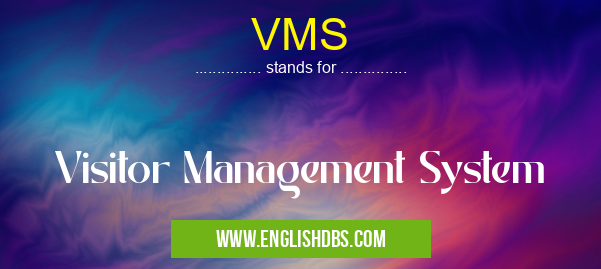What does VMS mean in MANAGEMENT
VMS stands for Visitor Management System. It is a software application that helps organizations manage the flow of visitors entering their premises. VMSs are typically used in conjunction with a physical security system, such as a door access control system or a video surveillance system.

VMS meaning in Management in Business
VMS mostly used in an acronym Management in Category Business that means Visitor Management System
Shorthand: VMS,
Full Form: Visitor Management System
For more information of "Visitor Management System", see the section below.
» Business » Management
How VMS Works
VMSs work by capturing visitor information, such as name, company, and purpose of visit. This information can be collected through a variety of methods, such as a self-service kiosk, a mobile app, or a receptionist. The VMS then stores the visitor information in a database and generates a visitor badge. The badge can be used to grant the visitor access to the premises and to track their movements throughout the building.
Benefits of Using a VMS
There are many benefits to using a VMS, including:
- Improved security: VMSs help to improve security by controlling access to the premises and by tracking the movements of visitors.
- Increased efficiency: VMSs can help to increase efficiency by automating the visitor check-in process and by providing real-time data on visitor activity.
- Enhanced customer service: VMSs can help to enhance customer service by providing visitors with a more convenient and efficient check-in experience.
Essential Questions and Answers on Visitor Management System in "BUSINESS»MANAGEMENT"
What is a Visitor Management System (VMS)?
A VMS is a software solution that manages the registration, tracking, and monitoring of visitors entering and exiting a facility. It enhances security, streamlines visitor management processes, and provides real-time visibility into visitor activity.
What are the benefits of using a VMS?
A VMS offers numerous benefits, including:
- Increased security by screening and authenticating visitors
- Streamlined visitor registration and check-in processes
- Enhanced compliance with industry regulations and security standards
- Improved efficiency and reduced administrative burden
- Real-time visitor tracking and reporting for improved situational awareness
What are the key features of a comprehensive VMS?
A comprehensive VMS typically includes the following features:
- Visitor registration and pre-approval capabilities
- ID scanning and verification
- Visitor badge printing and issuance
- Visitor tracking and monitoring
- Reporting and analytics
- Integration with access control systems
How does a VMS integrate with access control systems?
A VMS can integrate with access control systems to provide a comprehensive security solution. This integration allows for:
- Automatic locking and unlocking of doors based on visitor permissions
- Real-time tracking of visitor movements within the facility
- Audit trails and reporting on visitor access
What industries can benefit from using a VMS?
VMSs are widely used in various industries, including:
- Corporate offices and buildings
- Schools and universities
- Healthcare facilities
- Government agencies
- Event venues
Final Words: VMSs are an essential tool for organizations that want to improve their security, efficiency, and customer service. By automating the visitor check-in process and providing real-time data on visitor activity, VMSs can help organizations to manage the flow of visitors more effectively.
VMS also stands for: |
|
| All stands for VMS |
